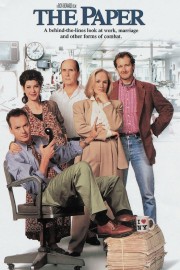The Paper
Ron Howard has always been one of the best in the business when it comes to managing ensembles, and his work in his 1994 dramatic comedy, “The Paper,” is some of the best of his career. At the center of it all is one of Michael Keaton’s finest, manic performances as Henry Hackett, an assistant editor at the New York Sun, which has developed a “cute” reputation among other papers in the city. Henry’s sick of being last in the minds of not just his competitors, but the public, as well. Unfortunately, he’s got a lot of other things on his plate also, starting with impending fatherhood, and a turf war with his managing editor about Page 1 after a shooting occurs that has racial implications. He also has a big decision to make about his future when he goes for an interview at a rival newspaper that could change his life. Henry has quite a day ahead of him.
“The Paper” is written by David Koepp and his brother, Stephen, and it’s quite a departure from the blockbuster likes of “Jurassic Park,” “Mission: Impossible,” “War of the Worlds,” and “Indiana Jones and the Kingdom of the Crystal Skull.” Action and excitement like those films try to provide are replaced by breathless arguments about deadlines and the race to get quotes and information that would change the story that gets run, and it’s just as exciting as raptors stalking their prey, Ethan Hunt being chased around Europe, or Indiana Jones’s latest adventure. Making it better, there’s a bracing intelligence and emotional core that drives the moral dramas at the center of the film that allows Howard and the cast to play with some juicy material. The film deals with the way reporting on a story in a particular way has real world implications, and how one story can lead to a change in perception that will last forever.
Howard’s best films have dealt with blue-collar, regular people and the way outside events (sometimes plausible, sometimes out of the ordinary) can impact their lives. In “The Paper,” it’s the daily grind of working at a newspaper on a normal life, first and foremost. Henry’s wife Marty (Marisa Tomei, who proved with this performance her surprise Oscar win was no fluke) is 8 1/2 months pregnant, and as much as she misses her job at the Sun, she misses her husband more. (When the film starts proper, Henry is in bed, still in his suit, after getting home at 4am.) She’s scared he’s not going to be there to help out with their child when push comes to shove, and a lunch with an old friend (Catherine O’Hara) only pushes her anxieties further. Henry has anxieties, as well, but his are rooted in his ability to juggle work and a personal life, and work is winning, especially on a day when the obvious Page 1 story (about a shooting where two black teens who were walking by are arrested) has different vantage points the paper who take in reporting it, but the honest one is the most difficult one to prove. When Marty comes to find out about a job interview he went on at a rival paper, Henry has 4-5 work crises that crowd in, as well, not to mention a 3pm story meeting he’s already late for. When he’s supposed to meet his parents and Marty for dinner, he’s not only late because of the need to approve Page 1, but also can’t stay because he has to get a cop quote for the story he feels obligated to get. This film gets the stress and anxiety of juggling multiple responsibilities of life very right, but that’s not a surprise given how well Howard dealt with family in “Parenthood.” “The Paper” has a lot in common with that film, in that regards, and it is just as successful in looking at working-class individuals who try to get through life as best they can, with Keaton and Tomei at the center of everything making it believable.
“The Paper” isn’t just about Henry and Marty, though, and that’s where Howard’s talents with ensembles work. As Henry’s rival editor, Alicia, Glenn Close is a firecracker who has a hard time playing well with her coworkers, but also realizes that tough decisions need to be made, although her personal life, like Henry’s, isn’t exactly rosy. The same could be said about Robert Duvall’s chief editor, Bernie, who is dealing with prostate cancer and a daughter that won’t speak to him, all the while trying to make sure Henry and Alicia don’t kill one another. He can still find himself thrust into the madness, as well, as when he inadvertently finds himself talking to the target of one of his columnist’s scorn, a Parking commissioner named Sandusky (Jason Alexander), in a bar. Sandusky has been shamed recently by a Sun columnist, McDougal (Randy Quaid, very funny), who is upset about how his vintage car was damaged after being towed. All of these may seem like unrelated tales, but they only add to the coiled tension surrounding Henry and Marty during this brutal 24-hour time period that will change their lives forever. Fueled by a sharp, staccato pacing by editors Dan Hanley and Michael Hill that’s enhanced by a score by Randy Newman, “The Paper” gets how much tension can find it’s way into a single day, and the result is a blistering film that’s as full of genuine tension and suspense as it is honest heart, as if we were watching a documentary rather than a major Hollywood film.










